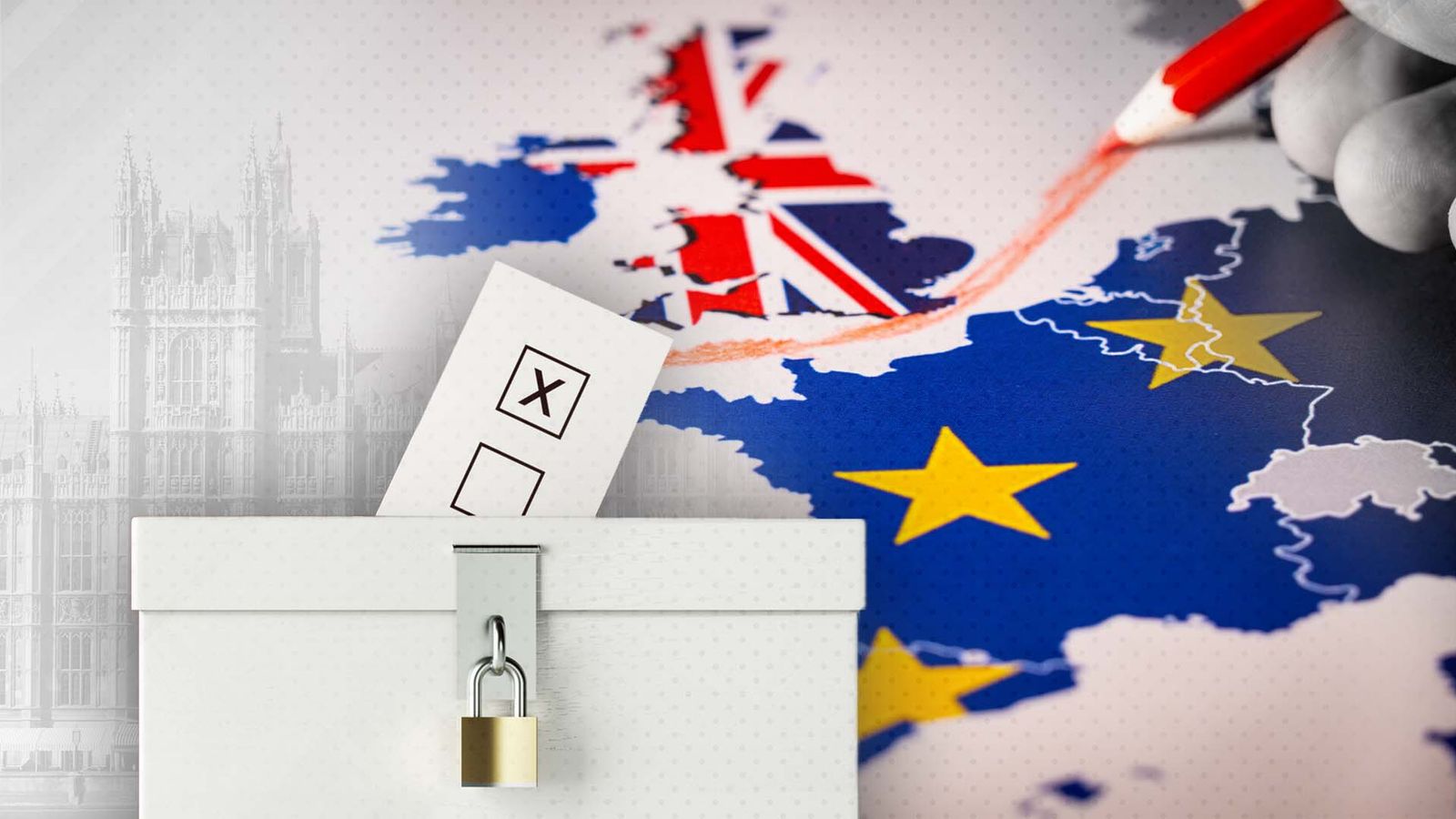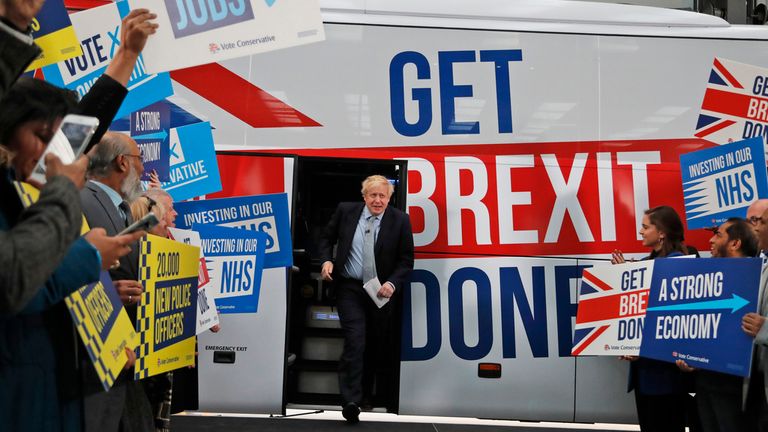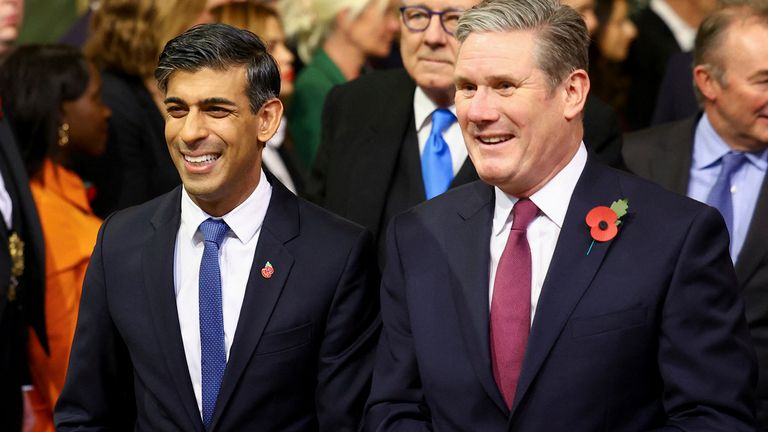Does Brexit matter anymore?
The UK’s decision to leave the European Union in 2016 has been the driving, and dividing, force in British politics ever since the referendum campaign.
It seeded the turmoil inside the Conservative Party, which led to five different prime ministers taking over in Number 10.
The public grew tired of all the delay and argument in parliament and handed Boris Johnson his “stonking” victory at the last general thanks to his promise to “Get Brexit Done”.
That was one thing Mr Johnson did deliver, but it continued to bedevil his party as Rishi Sunak found out when he had to deliver the Windsor declaration under threat from Washington DC.
Every Conservative prime minister since David Cameron has posed as a committed leaver, vowing to deliver the will of the people as reflected in the 52% to 48% vote to leave.
They must be wondering why they bothered. In opinion polls, Brexit does not feature in the top 10 issues of concern to voters.
Clear majorities – 75% and upwards – think Brexit has damaged the economy.
And, as COVID and the cost of living came to dominate the agenda, the Conservatives have been consistently trailing Labour by some 20 points or so for more than a year.
Given he now looks as if he is going to be the next prime minister – and given he was a Remainer who initially wanted there to be a second referendum to reverse the result – some of the Labour leader’s allies are wondering why Sir Keir Starmer is so reluctant to talk about closer relations with the European Union.
As this year draws to a close, politicians and other occupants of the Westminster bubble are drawing up their annual audits of how things stand with extra enthusiasm because a general election must take place at some point in the next 13 months.
At the Resolution Foundation conference in the QEII Centre, there were guffaws when the Labour leader was asked why he has been writing about “the possibilities of Brexit”.
There was another striking moment at another meeting just off Parliament Square: UK In A Changing Europe’s annual report on the “state of public opinion”. Participants in public meetings are usually very cautious about making firm predictions.
Yet when I asked a panel comprising the author of the 2019 Conservative manifesto, a Labour candidate at the next election and two leading political academics what they thought the outcome of the general election would be, all four of them predicted a majority Labour government – without hesitation or deviation.
They were speaking days before the latest Tory bust-up and cabinet resignation over immigration policy, which is unlikely to have give the Conservative Party a boost.
Some on the Labour frontbench are more enthusiastic about Europe than others.
David Lammy, the shadow foreign secretary, says that closer ties with the EU are his “number one priority” and does not wholly discard the dream of rejoining one day.
That is a long way off.
Sir Keir has muttered that he would like to “rewrite” a better trade agreement after 2025 – but he has also ruled out the UK re-entering either the customs union or the single market.
Both would be prerequisites for EU membership, as well as the principal triggers of economic benefit, according to financial experts.
Labour is well aware that the single market would mean freedom of movement of EU citizens in and out of the UK. Leave campaigners played up the immigration issue, which continues to be a major concern of the electorate, even though the record levels of migration since the referendum have been by people from outside the EU.
Those arguing for a more positive stance from Sir Keir point out that an overwhelming majority of those who intend to vote Labour are in favour of closer relations with the EU.
Indeed, it would encourage 34% to vote Labour. Another third, 38%, say it would have no impact on their voting intentions.
Read more politics news:
Top civil servant summoned by MPs over Rwanda plan costs
UK government’s veto of Scotland’s gender reform bill ruled lawful
Tories urged to delete social media post featuring swearing newsreader
The catch is that most of those either pro or indifferent are going to vote Labour anyway. More detailed examination of polling carried out for UK In A Changing Europe explains why Sir Keir is unlikely to make renegotiating closer ties with the EU a major part his election campaign.
To secure a comfortable majority, Labour needs to appeal beyond its core supporters – winning over some of those who voted Tory in 2019, including those who switched to Boris Johnson in the so-called “Red Wall”: less affluent, pro-Brexit constituencies in the Midlands and North of England.
Some 39% of those who voted for Brexit in 2016 and Conservative in 2019 say they would be less likely to switch to Labour if it reopened the question of EU membership, compared to a mere 14% who would be attracted. They would be put off even though they have soured on voting Leave.
Startling new findings that a narrow majority of Leave voters, 52%, now say the economy is worse off because of Brexit and that a clear majority of them, 58%, say they would vote Remain in another referendum.
Mr Sunak and the Conservatives are trying to keep their 2019 voters by branding Sir Keir an EU lover.
Sir Keir is advocating more cooperation with the EU on illegal migration across the channel. At PMQs, Mr Sunak claimed that would mean accepting “100,000” coming in from the EU.
Unlike the stalled Rwanda scheme, the Conservative government’s own increased cooperation with, and payments to, the French authorities do seem to have reduced numbers crossing the Channel.
Mr Sunak however insists this joint working is “not for reasons of sentimentality”. He frames it instead in competitive terms repeatedly pointing out that numbers crossing into Britain are “down by a third” this year, while migration into the EU across the Mediterranean is “up by 80%”.
In a similar vein, the prime minister brandishes any economic statistics which compare the UK favourably to European performance and ignores contradictory indicators. None of this has endeared the UK to its former EU partners.
Mr Sunak has avoided or refused routine meetings with his EU counterparts. In Opposition, Labour has sought them eagerly and plans to establish routine contacts if it is in government after the general election.
Yet Sir Keir is determined that there will be no outbreak of euro-enthusiasm in his ranks.
Whatever the opinion polls say, or the experts predict, the Labour leadership really do not believe that they have the next election in the bag yet.
To stamp out complacency and to quite literally wipe smiles of faces, the shadow cabinet were treated to a compulsory gloomy PowerPoint presentation last week. It pointed out that the issues which determined the results of previous elections were often not even on the radar twelve months before the vote.
Brexit, that most polarizing of British political issues this century, has dropped out of sight. Between now and the election Sir Keir will resist Conservative goading grimly, determined to say as little as possible about Labour’s plans for Europe beyond occasionally bemoaning “the smouldering cinders of the bridges the Tories have burnt”.


